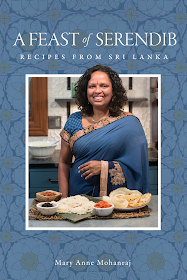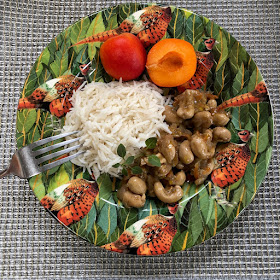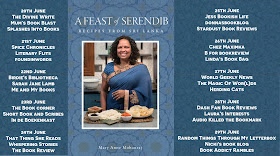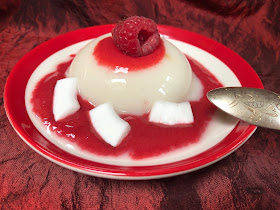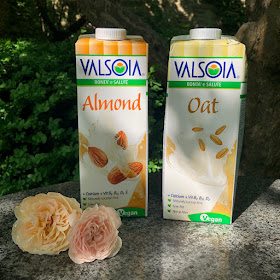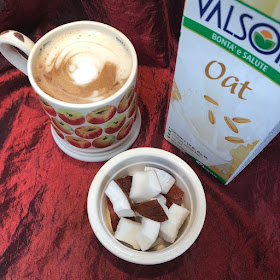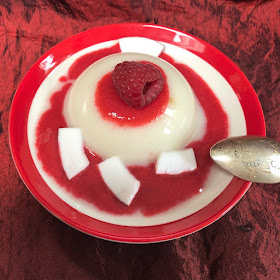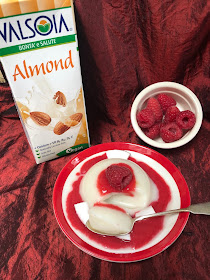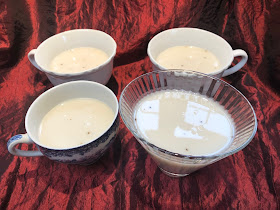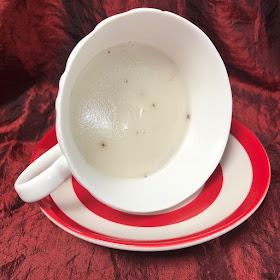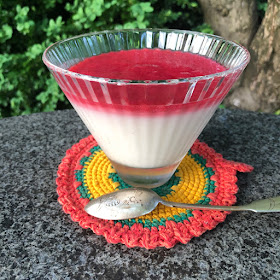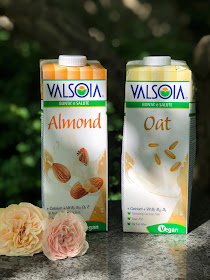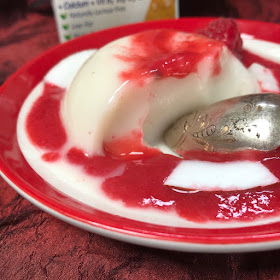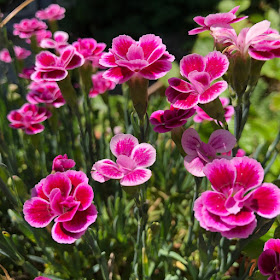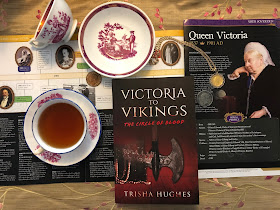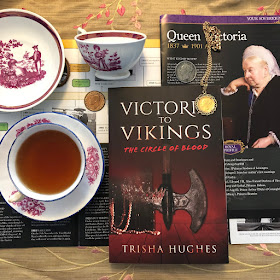I'm a little bit embarrassed to say just how many cook books I have. Let's just say, enough to stock a small library.
Yet a new cook book is always a cause of excitement.
A Feast of Serendib by Mary Anne Mohanraj is a type of cook book I enjoy to read, as it's not just a selection of recipes, but a story of the author's ethnic background and family history including old photos and lovely snippets of personal stories related to recipes. You get to know the author, as she describes her favourite food and her family history.
Synopsis:
Dark roasted curry powder, a fine attention to the balance of salty-sour-sweet, wholesome red rice and toasted curry leaves, plenty of coconut milk and chili heat. These are the flavors of Sri Lanka.
Sri Lanka was a cross roads in the sea routes of the East. Three waves of colonization - Portuguese, Dutch and British - and the Chinese laborers who came with them, left their culinary imprint on Sri Lankan food. Sri Lankan cooking with is many vegetarian dishes gives testimony to the presence of a multi-ethic and multi-religious population.
Everyday classics like beef smoore and Jaffna crab curry are joined by luxurious feast dishes, such as nargisi kofta and green mango curry, once served to King Kasyapa in his 5th century sky place of Sigiriya.
Vegetable dishes include cashew curry, jackfruit curry, asparagus poriyal, tempered lentils, broccoli varai and lime-masala mushrooms. There are appetizers of chili-mango cashews, prawn lentil patties, fried mutton rolls, and ribbon tea sandwiches. Deviled chili eggs bring the heat, yet ginger-garlic chicken is mild enough for a small child. Desserts include Sri Lankan favourites: love cake, mango fluff, milk toffee and vattalappam, a richly spiced coconut custard.
In A Feast of Serendib, Mary Anne Mohanraj introduces her mother's cooking and her own Americanizations, providing a wonderful introduction to Sril Lankan American cooking, straightforward enough for a beginner, and nuanced enough to capture the flavor of Sri Lankan cooking.
Review:
Mary Anne started writing a Sri Lankan cook book as a present for her Mum, writing down some of her recipes. Her mother had had to make many adaptations when she came to the States in 1973, for example, using a tomato ketchup instead of coconut milk. Then Mary Anne herself kept changing the recipes further, adapting them to her tastes.
As Mary Anne says in the Introduction: "But I try to accept the truth, that I will likely never cook exactly how homeland Sri Lankans would. My adaptations of my mother's adaptations are still tasty".
Let's look at the list of contents:
Appetizers and Snacks
Eggs, Poultry and Meat contents
Fish and Seafood
Vegetables
Accompaniments
Grains
Drinks
Sweets
There is a good selection of recipes for meat eaters and vegetarians. I had a quick look at the section with Vegetable dishes (22 recipes), and most of them include coconut milk, and no dairy, so are suitable for vegans as well.
There are a couple of recipes in this section which include a Maldive fish as one of the optional ingredients. It is a staple of the Sri Lankan cuisine, but obviously that would change the recipes from vegetarian to pescatarian. I have tried to google for the vegetarian/vegan substitute for the Maldive fish, and it looks like a dark miso might be a possible candidate, but don't take my word for it. I haven't tried Maldive fish, so am not an expert on its taste or alternatives.
This book celebrates the best of the Sri Lankan cuisine.
I have bookmarked several recipes to try, like Milk toffee with cashews, Golden rice pilaf, green mango curry, mango pickle and others.
So far I have tried only one recipe from the book -
Cashew Curry, which is a rich vegetarian/vegan dish. It would be great as part of a curry night, with several different curry dishes to mix and match.
I'm looking forward to expanding my curry repertoire. The recipes in the book seem easy to follow, and there are lots of little tips on the possible alternatives, if you cannot source the right ingredients.
This is a book for everyone who would like to be able to cook real Sri Lankan food. It includes a comprehensive and fascinating collection of mouthwatering recipes. Lovingly compiled, this cook book will appeal to both amateurs and committed foodies.
My only slight niggle is that I would have liked more photos in the book, as for me they are often the first thing which draws me to a recipe.
Another thing to keep in mind: as the cook book is written by an American author, the measurements are also American (i.e. cups, stick etc).
--------------------------------------------------------------------------------------------------------------
I have an exclusive recipe for Ginger Garlic Chicken from the book.
Ginger-Garlic Chicken (recipe reproduced with permission from the publisher)
(30-90 minutes, serves 6-8)
The timing on this is so variable because you can either do it the long way described below, the way my mother recommends, which is definitely a bit tastier - or you can do a much faster version, where you mix the spices with the chicken, skip the marinating, and then just sauté the chicken in the pan on medium-high until cooked through and serve. I use both methods, mostly depending on how much of a hurry I'm in. Regardless of which method you use, this dish is best served fresh; if it sits, the chicken will tend to dry up and not be as tasty.
NOTE:
This is my daughter's favourite chicken dish, and one she always greets with delight; she started eating it when she was about five, with no added chili powder. Over time, I've added a little more chilli powder when feeding it to both kids, serving with milk to help them along, you can also use black pepper if you'd prefer.
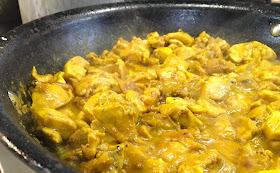 |
| Photo credits: Mary Anne Mohanraj |
Ingredients:
1 heaping tsp ginger powder
1 heaping tsp garlic powder
1 heaping tsp turmeric
1 tsp salt
12 chicken thighs, about 2 lbs, deboned and cut bite-size
vegetable oil for frying
1/2 to 2 heaping tsp red chili powder (to taste, optional)
1. Mix first four spices in a large bowl, add chicken pieces and rub with your hands until well coated. Marinate 1/2 hour.
2. Heat oil on high; add chili powder (if using) and cook 15 seconds, stirring.
3. Add chicken and sear on high, turning to brown all sides.
4. Reduce heat to low and cover; cook approximately 15-20 minutes, until meat is cooked through.
5. Uncover and cook until all the liquid is gone.
6. Tilt pan and push chicken pieces to one side; allow excess oil to drain to one side for 5 minutes. Remove chicken to dish and serve hot.
NOTE: If reheating a day or two later, I recommend reheating in a pan with a little coconut milk; just simmer 5-10 minutes, enough for the milk to thicken with the spices into a nice sauce. Or serve dry chicken with a nice coconut-milky vegetable curry, like carrot or beetroot curry.
About the Author:
Mary Anne Mohanraj is the author of
Bodies in Motion (HarperCollins),
The Stars Change (Circlet Press) and 13 other titles.
Bodies in Motion was a finalist for the Asian American Book Awards, a USA Today Notable Book, and has been translated into six languages.
The Stars Change was a finalist for the Lambda, Rainbow, and Bisexual Book Awards.
Monhanraj founded the Hugo-nominated and World Fantasy Award-winning speculative literature magazine,
Strange Horizons, and also founded
Jaggery, as S.Asian & S.Asian diaspora literary journal.
She received a Breaking Barriers Award from the Chicago Foundation for Women for her work in Asian American art organizing, won and Illinois Arts Council Fellowship in Prose, and was Guest of Honour at WisCon. She serves as Director of two literary organisations, DesiLit and The Speculative Literature Foundation. She serves on the futurist boards of the Xprize and Chicago's Museum of Science and Industry.
Mohanraj is Clinical Associate Professor of English at the University of Illinois in Chicago, and lives in a creaky old Victorian in Oak Park, just outside Chicago, with her husband, their two small children, and a sweet dog. Recent publications include stories for George R.R. Martin's
Wild Cards series, stories at
Clarkesworld,
Asimov's, and
Lightspeed, and an essay in Roxane Gay's
Unruly Bodies. 2017-18 titles include
Survivor (a SF/F anthology),
Perennial, Invisible 3 (co-edited with Jim C. Hines), and
Vegan Serendib.
Social Media Links
Facebook - Mary A. Mohanraj
Twitter - @mamohanraj
Instagram - @maryannemohanraj
Website: www.maryannmohanraj.com and http://serendibkitchen.com
Disclosure: Many thanks to Mary Anne Mohanraj, Serendib Press and Rachel's Random Resources for my copy of the book!
This post is part of the blog tour, you can discover more recipes from the book here, for example, a recipe for a vegetarian
Beet curry on ShortBookandScribes:
Giveaway:
If you enjoy exploring the world cuisines and love the sound of this book, the lovely people from Serendib Press have offered an
e-copy of A Feast of Serendib as a giveaway prize for my blog readers.
T&Cs:
1. The giveaway is open internationally.
2. Giveaway ends on 3 July 2019 (midnight).
3. To be in with a chance of winning, please leave a comment, answering a question:
Have you tried Sri Lankan food, and what is your favourite Sri Lankan dish? (If you haven't tried, which dish would you like to try first?)
4. If you are leaving a comment as Anon, make sure there is your name or username so that I can get in touch with you. If you have a Twitter name, that's the easiest way to contact you if you win.
5. I will contact the winner regarding their email address after the closing date. If they do not reply within 7 days, the prize will be allocated to another person.
Good luck!






















